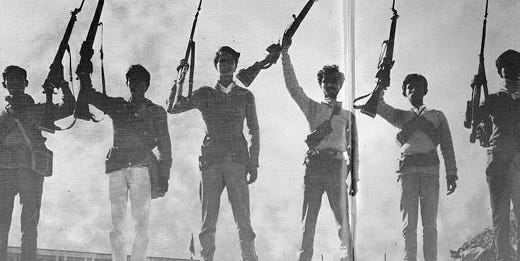After the war ended, on the day Sheikh Mujib was released from the Pakistani jail, Bhutto, the mastermind behind the scenes, came to greet him. Dr. Kamal Hossain was also present. Bhutto said to Mujib, "Your Sonar Bangla is now under the control of the Indian Army. What did you gain by making your country independent?" Mujib, agitated, asked Dr. Kamal, "Is this true?" Dr. Kamal nodded slightly. In a stern voice, Sheikh Mujib said to Bhutto, "If that is the case, then I will go to war against India again, and I will take you with me."
From Karachi, he went to London, and on his way to Delhi, the young barrister Amirul Islam was told by Sheikh Mujib, "Listen, at the first opportunity, tell Madam to withdraw her troops; otherwise, the babus (bureaucrats) will create obstacles." Upon his arrival in Delhi via London, he found that millions of Indians had come out to welcome him. When he began to speak in English, the crowd demanded that he give his speech in Bengali. He smiled and expressed his gratitude to everyone for helping the people of his country. In the subsequent bilateral meeting, after thanking Indira Gandhi, he said, "The people of Bengal will be forever grateful for what you have done. Now, if you could withdraw your troops, we could start building our country."
Indira Gandhi, who had traveled the world for months garnering support for Bangladesh and had personally worked to free Mujib from prison, was taken aback by this request. She replied softly, "Your Excellency, whatever you wish will be done." Indira Gandhi and her diplomats were taken aback by Sheikh Mujib's commanding personality.
Within three months, the Indian troops withdrew from Bangladesh, but before leaving, they engaged in unprecedented looting inside the cantonments and in factories. They didn't spare anything, from jute mill machinery, weapons left behind by the Pakistanis, to bicycles, tape recorders, and even plates and bowls. The Guardian reported that they looted items worth approximately 2 billion dollars. The destruction by the Pakistanis was compounded by the looting of the Indian troops. Subsequently, the JSD (Jatiya Samajtantrik Dal) formed a people's army and started setting fire to government establishments and jute warehouses across the country, demanding the establishment of communism. Moving away from the American sphere, no Western or Wahhabi Muslim country provided aid. Anarchy spread everywhere. The young freedom fighters, who had just gained independence, now took up arms across the country in the name of communism, making the situation even more fragile. Soon, the country faced a food crisis.
An injured freedom fighter told the communist Colonel Taher, "Leave all this and take charge of the Water Development Board. Do something." The adept Colonel Taher designed canals from rivers across Bangladesh so that all land could be irrigated. Using this design, later General Zia started the canal digging program after he came to power, which was initiated after Taher was executed.
Kissinger sat back and watched the drama unfold, enjoying the demise of a newly emerged country. The great Cuban revolutionary Fidel Castro, who was a staunch admirer of Mujib, sent a ship full of food supplies, which America sank in the Atlantic to incite civil war in Bangladesh due to hunger. The famine could not be prevented. Sheikh Mujib was compelled to invite the President of the World Bank to Dhaka and asked Finance Minister Tajuddin to see if he could secure some loans.
They sat down for a meeting. Robert McNamara was the longest-serving President of the World Bank and had visited Dhaka during the war in April 1971. At that time, he provided a $2 billion loan to Pakistan for purchasing weapons. Tajuddin Ahmed was the Prime Minister of the Bangladeshi government in exile, conducting the war from an office in Kolkata. The two were now face to face again in 1974.
At the beginning of the meeting, McNamara said, "Your Excellency, what do you want from me? How can I help you?" Tajuddin replied, "We don't want any money from you." McNamara furrowed his brows and asked, "Then what do you want?" Tajuddin replied, "Our country is agriculture-based. In the war, not a single bridge has been left standing; everything is destroyed. The crops produced in one place cannot be transported to another, leading to a food crisis. If we were given seven and a half lakh (750,000) cattle, we could cultivate everywhere because the Pakistanis slaughtered all our plowing cattle during the war."
McNamara, surprised, asked, "How much would seven and a half lakh cattle cost? Tell me, and the money will be arranged." Tajuddin responded, "As I said before, we don't need money. We need the cattle, and we also need ropes to tie them because the Pakistanis burnt those too."
This time, McNamara realized that Tajuddin was actually insulting him.
When the meeting ended, journalists asked Tajuddin about the meeting. He said, "We would rather eat grass for a hundred years than take a loan from them."
An annoyed Sheikh Mujib dismissed Tajuddin the very next day.
Do today's youth know how much their ancestors sacrificed for dignity and rights? How many millions of people gave their lives willingly? How many women were raped? What happened to the war babies? Where were they sent by various charitable organizations without their parents? Did they survive, or were they sacrificed for some child god? They don't know. They should know who is in power today, standing on the blood of their forefathers, and who their masters are. Otherwise, history will show them no mercy. They have forgotten the reforms for which they fought. Instead of reform, they are rejoicing over replacements, making yet another arch-enemy their master.



